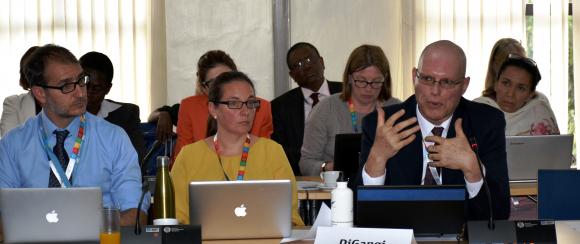Activities
23 May, 2016:
Sara Brosché, PhD, IPEN's Lead Paint Elimination Project Manager, participated in a side event called Four Years to Phase Out Lead in Paint Worldwide, which was organized by the Lead Paint Alliance and took stock of the progress towards their goal to have legal limits to lead in paint in all countries by 2020. At the event, the US Environmental Protection Agency presented an interactive map showing an estimate of economic cost of childhood exposure to lead by the New York University. During the panel "Cross-sector cooperation towards the phasing out of lead in paint,” Dr. Brosché talked about the work IPEN has been doing to eliminate lead from paint, and emphasized the need to engage all stakeholders to successfully eliminate lead paint in a country.
Additional participants included, amongst others, Mr. Eisaku Toda (Chemicals and Waste Branch, UNEP), Ms. Walker Smith (US Environmental Protection Agency), Mr. Peter Numatala (Kenya Bureau of Standards), Ms. Stela Drucioc (Ministry of the Environment, Republic of Moldova) and Mr. Jonas Leones (Department of Environment and Natural Resources, the Philippines).
For more information about the event, see: http://www.unep.org/chemicalsandwaste/LeadandCadmium/LeadPaintAlliance/M...

23 May, 2016:
Joseph DiGangi, PhD, IPEN Senior Science and Technical Advisor, participated in a side event on Advancing Sustainable Chemistry in a Sustainable Development Context: Opportunities for Global, Regional and National Chemicals Management. The side event, organized collaboratively through the Government of Germany, Government of Ghana, the United Nations Environment Programme (UNEP) Chemicals and Waste Branch of DTIE (Department of Technology, Industry and Economics) and the Basel-Rotterdam-Stockholm Secretariat, had the following objectives:
• Discuss the Sustainable Chemistry concept and related opportunities from developing countries’ perspectives;
• Examine the potential of Sustainable Chemistry in a SAICM beyond-2020 and 2030 Sustainable Development Agenda context;
• Provide an update on recent international developments and discussions related to Sustainable Chemistry and the chemicals and waste dimensions of the SDGs; and
• Showcase specific initiatives to advance sustainable chemistry, including related policy analysis and technical support.
Mr. DiGangi participated in the interactive panel discussion during the event.
For more information, see this invitation and the list of side events on the UNEA website.

Conference variant

